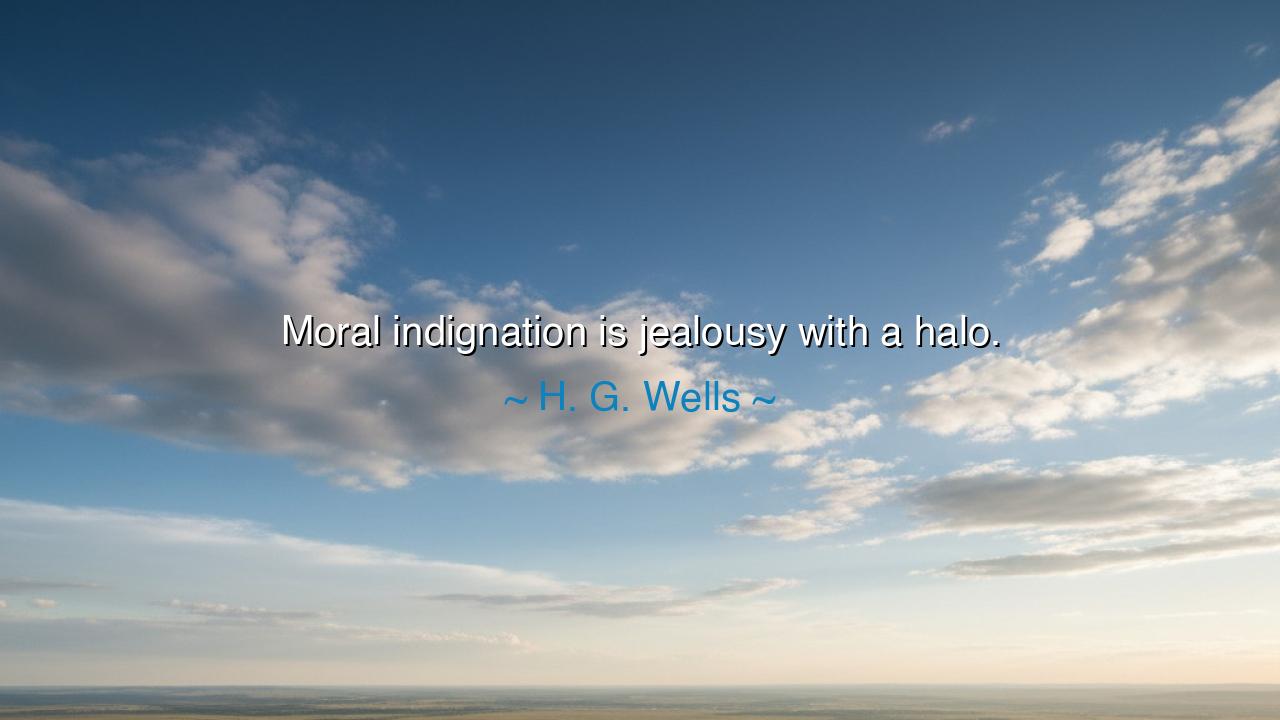
Moral indignation is jealousy with a halo.






There are truths so piercing that they strip away the masks we wear before the world, and among them shines the biting wisdom of H. G. Wells, who once said: “Moral indignation is jealousy with a halo.” In these few words, Wells—philosopher, historian, and prophet of modern times—laid bare one of the deepest hypocrisies of the human spirit: that our so-called righteousness often springs not from virtue, but from envy dressed in divine robes. His quote is not an attack on morality itself, but a warning to those who mistake jealousy for justice, who condemn others not because they love goodness, but because they resent success, freedom, or happiness that is not their own.
To understand the meaning of this quote, one must first know the nature of moral indignation. It is that fiery outrage one feels upon seeing what seems to be wrong or unjust. At its best, it is the foundation of reform and the voice of conscience. But at its worst—and it often becomes so—it is merely jealousy disguised as purity, resentment masked as virtue. Wells reminds us that when a person burns with righteous anger, he must first ask himself: “Am I angry because wrong has been done—or because someone else possesses what I cannot have?” For jealousy, when cloaked in the language of morality, gains a dangerous power. It convinces a man that his bitterness is noble, and that his envy is holy. And thus, jealousy puts on a halo and walks the earth as virtue.
H. G. Wells spoke from deep understanding of human nature. Living in an age of moral upheaval—the turn of the 20th century—he witnessed how societies, governments, and individuals justified cruelty in the name of righteousness. He saw how pride and envy could disguise themselves as principle, how moral crusades often hid personal resentments. His words are a mirror, reflecting not just the corruption of politics or religion, but the everyday hypocrisy within each human heart. For even the simplest soul has felt it—the thrill of condemnation, the subtle pleasure of looking down upon another. It is that moment when one’s anger feels pure, even holy—yet beneath it lies the secret satisfaction of superiority. This, Wells warns, is not virtue but vanity.
History offers countless examples of jealousy disguised as morality. Consider the trials of Galileo Galilei, who dared to reveal that the earth was not the center of the universe. The Church’s scholars condemned him as heretic, claiming moral and spiritual outrage. But behind their indignation lay something far more human—jealousy. They envied the man whose intellect surpassed theirs, whose courage threatened their authority. They did not defend faith so much as they defended pride. Their “moral indignation” became the halo upon their jealousy, making their persecution appear righteous in the eyes of the ignorant. Thus, they condemned a man of light while believing themselves defenders of truth.
And so it has been through the ages: the witch hunts, the purges, the scandals of politics and even of daily life—all have sprung from this same poisoned root. One person rises in success or beauty, and another cloaks his envy beneath words of virtue. He calls the other “arrogant,” “unworthy,” or “sinful,” and in his judgment finds satisfaction. But beneath his halo glows the green fire of jealousy. The world has burned its saints and geniuses not out of hatred for evil, but out of resentment for excellence. Wells’s insight is timeless because the disease he names is eternal—the envy that justifies itself by pretending to be good.
Yet, there is wisdom and hope in these words, if we have the courage to look inward. Wells’s quote invites us not merely to judge others, but to examine our own hearts. When anger rises within us, we must pause and ask: “What is its source?” Is it love for justice—or jealousy of another’s fortune? Is it compassion for the wronged—or resentment that others are praised while we are overlooked? The wise understand that true moral strength is humble, never proud. It seeks to uplift, not to condemn; to heal, not to harm. Jealous indignation destroys others to feed the ego, but moral courage endures quietly, seeking truth without applause.
The lesson, then, is this: purify your motives before you judge. Do not mistake the thrill of condemnation for the glow of righteousness. When you feel moral outrage, temper it with self-examination. Ask whether you wish to correct or simply to compete. Guard against the halo of jealousy, for it blinds the soul with false light. True morality requires not passion, but purity—an unselfish love of truth that fears no comparison and desires no superiority.
And so, let H. G. Wells’s words echo across generations: “Moral indignation is jealousy with a halo.” It is a warning and a mirror. The halo of jealousy is seductive—it flatters, it deceives, it convinces us that we are right even when we are merely resentful. But wisdom comes to those who remove it, who face their envy honestly and replace judgment with understanding. For the truly moral man does not shine by condemning others; he shines by mastering himself. And in that victory over envy, the soul finds not a false halo, but the light of genuine virtue—clear, humble, and eternal.






AAdministratorAdministrator
Welcome, honored guests. Please leave a comment, we will respond soon